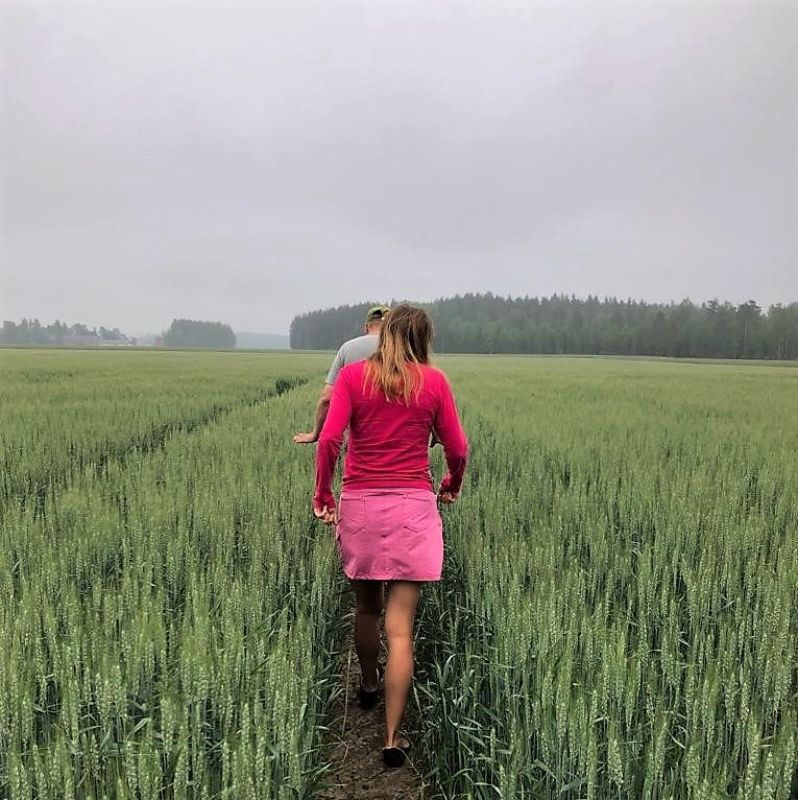Advisory Representative and Country Coordinator
“The best part of my work is collaborating with farmers and traders. This consists of joint problem-solving, which requires me to keep up with the times. Long work experience in this field is useful. I also enjoy travelling around Finland in summer. The farmers that welcome me on the farms are, almost without exception, nice, approachable and sincere.”

- Minni Tarkkanen
- Advisory Representative and Country Coordinator at Bayer.
- Graduated with a Master’s degree in Agriculture and Forestry from the University of Helsinki and completed the required amount of studies in agricultural sciences.
- Thirteen years of work experience in the field.
Briefly explain what you do for a living.
I work as the country coordinator for crop science in an international company called Bayer. I am responsible for selling Bayer’s plant protection products to agricultural shops. The plant protection products I sell are intended for use in fields in order to provide farmers with the highest quality of crops.
How have you ended up in the profession of your choice?
In general upper secondary school, I was interested in biology. I was only uncertain about whether I should apply to study biology or agricultural and forestry sciences after upper secondary school. I chose the latter.
I completed the practical training included in my agricultural and forestry studies at the experimental farm in Hauho. As a result of the traineeships, I became increasingly interested in agriculture and, in particular, plant pathology. Plant pathology is a scientific study of plant health as well as diseases and their remedies. Unlike many students in the field, I don’t come from a farming background.
Describe your typical working day or week.
My working weeks vary by season. Between April and September, I tour around fields where Bayer’s products have been used. I am responsible for the entire area south of Oulu, so the work involves a lot of driving. During the growing season, I also advise farmers by phone. Farmers can be concerned about issues such as which product is effective for which weed, or what would be the best time for spraying.
During the winter, my work mostly consists of office work. Then, sales negotiations are held with agricultural shops, and marketing materials and measures are planned to promote sales. In addition, I participate in events and training days for farmers, and organise product presentations.
What kind of work environment or working hours do you work in?
The duties of a country coordinator include both office and outdoor work. In the winter season, when I do paperwork, I work during the day, except for a few events in the evening. When I tour around the fields in spring and summer, my work days are long, and every day includes travelling. I may leave Espoo to Ostrobothnia in the morning and come back the same night. Fortunately, I can make up my own schedule to a large degree.
What kind of competence or qualities are required in the profession?
As a Bachelor of Agriculture, you can work in a variety of different tasks, so you often need expertise in a specialised field. An interest in and a positive attitude towards Finnish food production serve as sources of motivation at work. I work with sales, but you need more than just a sales-oriented attitude to succeed in this job. In the agricultural sector, sales are based on strong expertise, which requires knowledge of products, weeds, pests and crop rotation. This work requires an outgoing attitude, as a large part of the work involves interaction with farmers.
What is the best thing about your profession?
The best part of my work is collaborating with farmers and traders. This consist of joint problem-solving, which requires me to keep up with the times. Long work experience in the field is useful. I also enjoy travelling around Finland in summer. The farmers welcoming me on the farms are, almost without exception, nice, approachable and sincere.
What are the downsides of the profession or what seems challenging?
It seems challenging that some of the regulations related to the green transition conflict with my own experience gained through work. I fear that the regulation of pesticides will cause serious difficulties in domestic food production. The use of products that are important for many farms is prohibited even though these products are used very moderately in Finland. At the same time, food is being imported from countries where pesticides banned by us are permitted. I find this contradiction frustrating.
What would you tell a person considering the profession of a Bachelor of Agriculture?
If you are interested in this field, I recommend that you apply for this sector regardless of your age or background. Bachelor of Agriculture students tend to be a mixture of different ages and backgrounds, and everyone is sure to find like-minded company. If you have already started studying in the field, I recommend that you are bold and apply for interesting traineeships. The community of Bachelors of Agriculture is small, so networking is worthwhile. I am positively surprised by the good atmosphere among people working in this sector.
How do you see the future of your profession?
The future of agronomists is looking good because food production is always needed. You can improve your employment prospects by gaining competence in something that is considered to grow in significance in the future. Such competences may include digital farming or precision farming.
